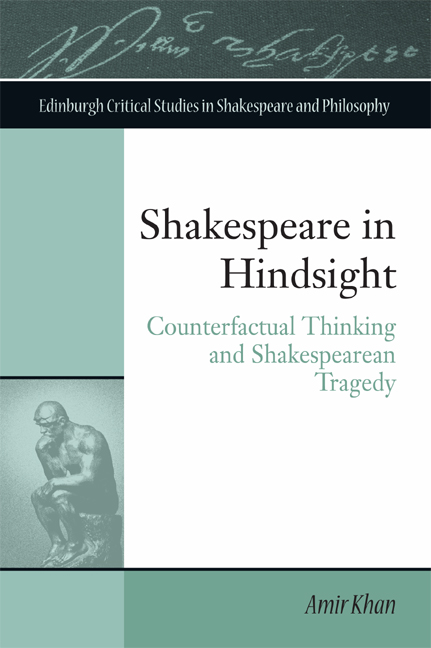Book contents
- Frontmatter
- Contents
- Acknowledgements
- A Note on Texts
- Series Editor's Preface
- Dedication
- 1 Introduction
- 2 My Kingdom for a Ghost: Counterfactual Thinking and Hamlet
- 3 Reversing Good and Evil: Counterfactual Thinking and King Lear
- 4 Staging Passivity: Counterfactual Thinking and Macbeth
- 5 Reversing Time: Counterfactual Thinking and The Winter's Tale
- 6 ‘Why Indeed Did I Marry?’: Counterfactual Thinking and Othello
- 7 Conclusion
- Notes
- Further Reading
- Index
- Frontmatter
- Contents
- Acknowledgements
- A Note on Texts
- Series Editor's Preface
- Dedication
- 1 Introduction
- 2 My Kingdom for a Ghost: Counterfactual Thinking and Hamlet
- 3 Reversing Good and Evil: Counterfactual Thinking and King Lear
- 4 Staging Passivity: Counterfactual Thinking and Macbeth
- 5 Reversing Time: Counterfactual Thinking and The Winter's Tale
- 6 ‘Why Indeed Did I Marry?’: Counterfactual Thinking and Othello
- 7 Conclusion
- Notes
- Further Reading
- Index
Summary
Negative capability, that is when man is capable of being in uncertainties, mysteries, doubts, without any irritable reaching after fact and reason – Coleridge, for instance, would let go by a fine isolated verisimilitude caught from the Penetralium of mystery, from being incapable of remaining content with half knowledge.
John KeatsNow to me the total works of Shakespeare are like a very, very complete set of codes and these codes, cipher for cipher, set off in us, stir in us, vibrations and impulses which we immediately try to make coherent and understandable.
Peter BrookDiscussing tragedy is tricky business. One is immediately tempted to outline a definition of tragedy, or, at the very least, to account for certain criteria that allow it to function. What this project proposes instead are reading strategies that will allow a ‘tragic effect’ to resonate. In particular, this project makes a case for reading ‘in the present’, what Stanley Cavell calls inhabiting ‘an experience of continuous presentness’. The most expedient way to do this will be to consider alternative possibilities to the accepted linear (narrative) developments of the plays at hand: assuming Macbeth had done x instead of y, for example, or that we, as readers, know x and not y. Yet this not in order to get away from the narrative unfolding of a play but, on the contrary, to become more intimate with it. These readings will be defined, somewhat loosely, as ‘counterfactual’ readings. Furthermore, the tragic effect will be linked to ‘discovery’– what Northrop Frye, and before him Aristotle, calls ‘anagnorisis’ – emphasising in particular a sense of ‘wonder’. This project argues that (1) the sorts of discoveries to be made are those that reveal or sustain a sense of wonder, the ‘uncertainties, mysteries, doubts’ that Keats associates with ‘negative capability’, and (2) this sense of wonder is key to the functioning of tragedy. Therefore, what is to be discovered cannot be prescribed because if we articulate beforehand just what it is we are looking for, we have removed ourselves from the realm of negative capability and, just because of that, the tragic effect is lost. One could make the case that these plays, in order to be tragic, must initiate a discovery procedure.
- Type
- Chapter
- Information
- Shakespeare in HindsightCounterfactual Thinking and Shakespearean Tragedy, pp. 1 - 40Publisher: Edinburgh University PressPrint publication year: 2015



